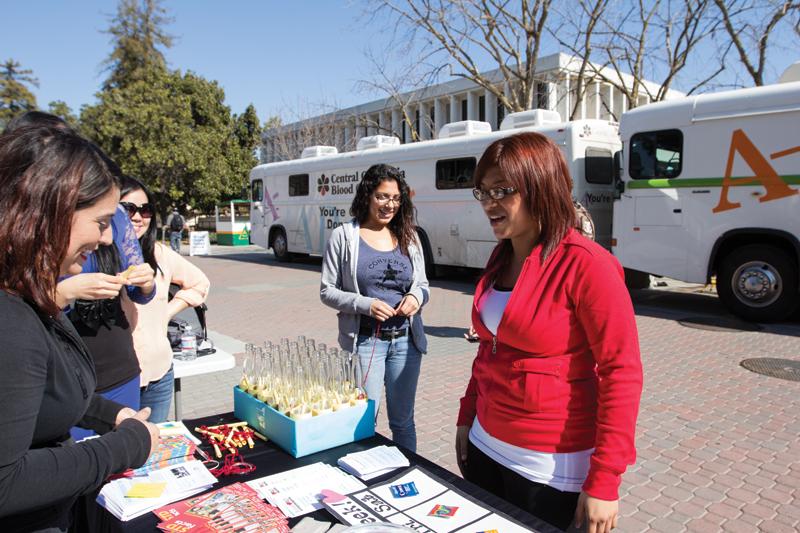
For students who may have wanted to avoid a thorny situation Thursday night, the Fresno State Health Center handed out red condom roses to students for Valentine’s Day and National Condom Week.
Prisma Cuevas is the Family Pact peer health educator (PHE) student coordinator who handles such events. The concept of “condom covers” was to wrap condoms up to make them look like candies or roses so that people would feel less awkward to receive them and learn about safe sex.
“So instead of us saying, ‘Take a condom,’ we say, ‘Here’s a candy,’ and they’ll take a candy and they like, ‘Oh, OK,” Cuevas said. “And we’ll say, ‘Take a rose.’ We don’t want to emphasize on condoms, just what it looks like.”
Britney Aaronian, a peer health educator, agreed that packaging condoms makes people more comfortable with receiving and taking them.
“Some people are shy, so they come up and grab a condom,” she said. “It’s kind of embarrassing to them. Sometimes they don’t feel very comfortable. ‘What is this person going to think if I go up and grab a handful of condoms?’ So packaging condoms makes them a little more discreet.”
However, not all students are embarrassed. There are students who are curious and attracted to the creative packaging.
“Sometimes they enjoy our packages,” Cuevas said. “They say, ‘I just want one because this looks cool. I’ll just take it.’ People love roses.”
In acknowledging of National Condom Week, the health center collaborates with Planned Parenthood to “promote the importance of using condoms for STDs and pregnancy prevention,” Cuevas said.
Aaronian is a public health major. This is her first time participating in the National Condom Week.
“I’m excited,” she said. “It’s a fun event. Valentine’s Day is fun, and February is the month of love, so it’s nice to promote safer sex and protecting yourself.”
The Peer Health Education program is created by Fresno State’s Family Pact. “[Peer Health Educators] are trained to do confidential one-on-one and group education,” said Cathy Yarmo, coordinator of health promotion and wellness services.
“Sexually transmitted infections, birth control — safer sex basically. Prisma oversees that group, so as part of their programming, they do a lot of outreach programming. National Condom Week is one of the events.”
During Valentine’s Day, Cuevas was at the booth in the Free Speech Area with other Family Pact members. They gave out free condoms, awareness pamphlets and bookmarks. Passersby could play a game where they had to throw a Nuvaring over bottles and answer a question from inside the bottle. If they got the answers right, they got a free condom rose.
Sofia Zabada, a psychology major, played the bottle game and found it interesting and informative. It was a good way for people who are normally uncomfortable talking about sexually transmitted diseases to learn about safe sex, she said.
Another program that started last August is the Condom Access Program (CAP). Under this program, condoms are wrapped in pink paper are put in baskets in the health center’s lobby.
About 6,262 condoms have been given out since August. CAP provides free condoms to teens around California.
“However, with our student population, it’s predominantly 18,19, 20 and upwards that come in and get the condoms,” Yarmo said. “We have them in our lobby. No questions asked, they can come in and grab condoms. It’s just part of our effort to make condoms accessible to them.”
The condoms are wrapped with information on how to use them, and information on sexually transmitted infections (STIs) and pregnancy prevention are placed beside the bowls.
Another way the PHE educates and promotes safe sex is “Don’t Cancel That Class.”
“We go to classes, so instead of the professor canceling classes, we go in and we play a jeopardy with them, and it’s all about safer sex and STIs,” Aaronian said. “It’s just a way to educate the students in a fun way.”
The PHE program urges students who need help or to just talk about STIs or pregnancy to look for them. Students can do so by walking up and asking if a peer educator is around for them to talk with, or even set up an appointment.
As a peer health educator, Aaronian loves the experience.
“I want to be in this profession, so it’s helped me to become aware of the things I can face in my career one day,” she said. “It’s just rewarding to help somebody, and once somebody comes in and feels comfortable to ask a few questions and open up to you, it’s just nice to build that connection with the students.”
The health center is also inviting students to apply for the PHE program. All students are eligible, and it is a one-year commitment volunteer job.
“The only thing we’ve been lacking in the last few years is men,” Yarmo said. “When we first started, we had three guys who were peer educators, and we’re just not seeing the men this time. So we want men, too!”
Application opens in April and students can apply online or at the health center.





